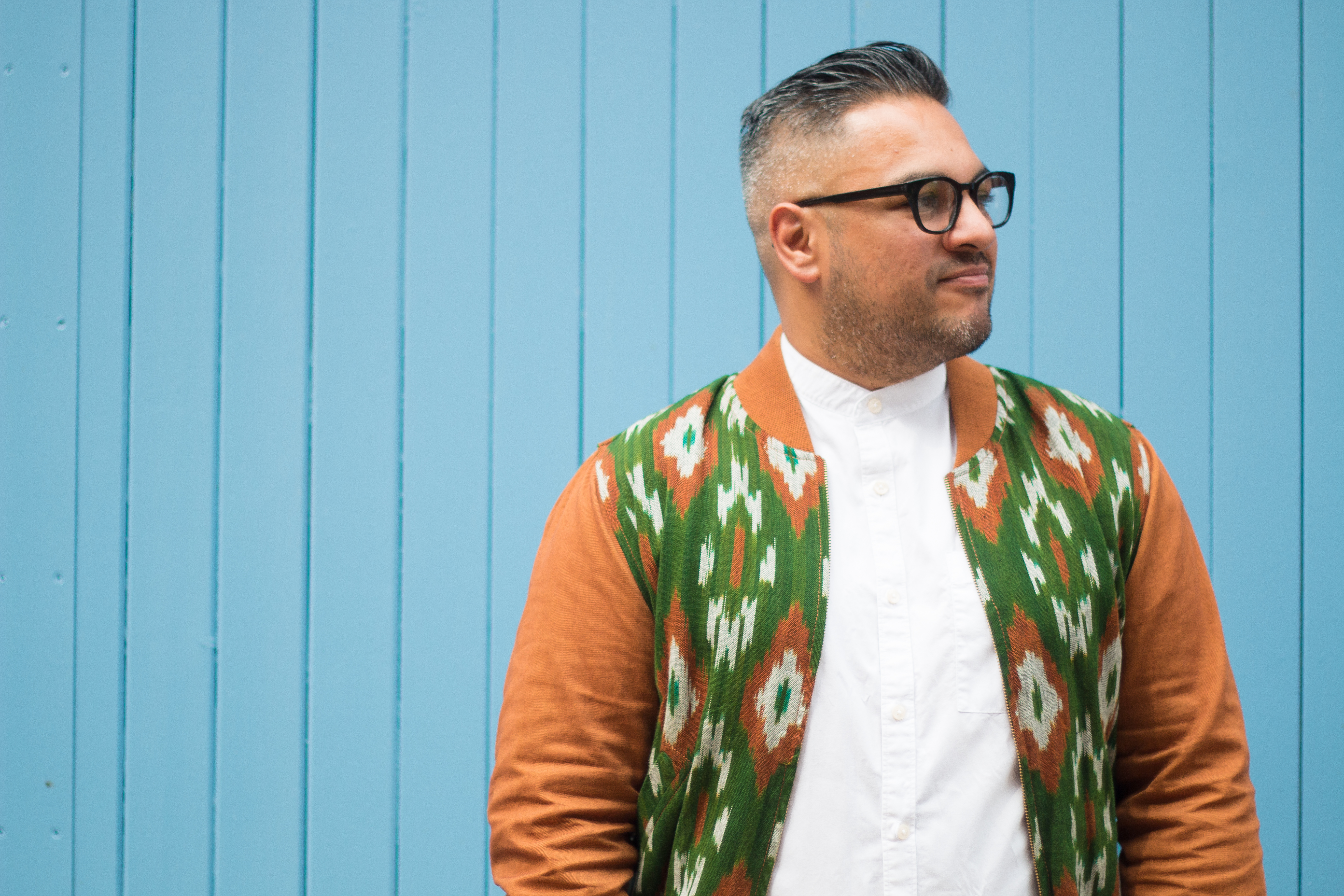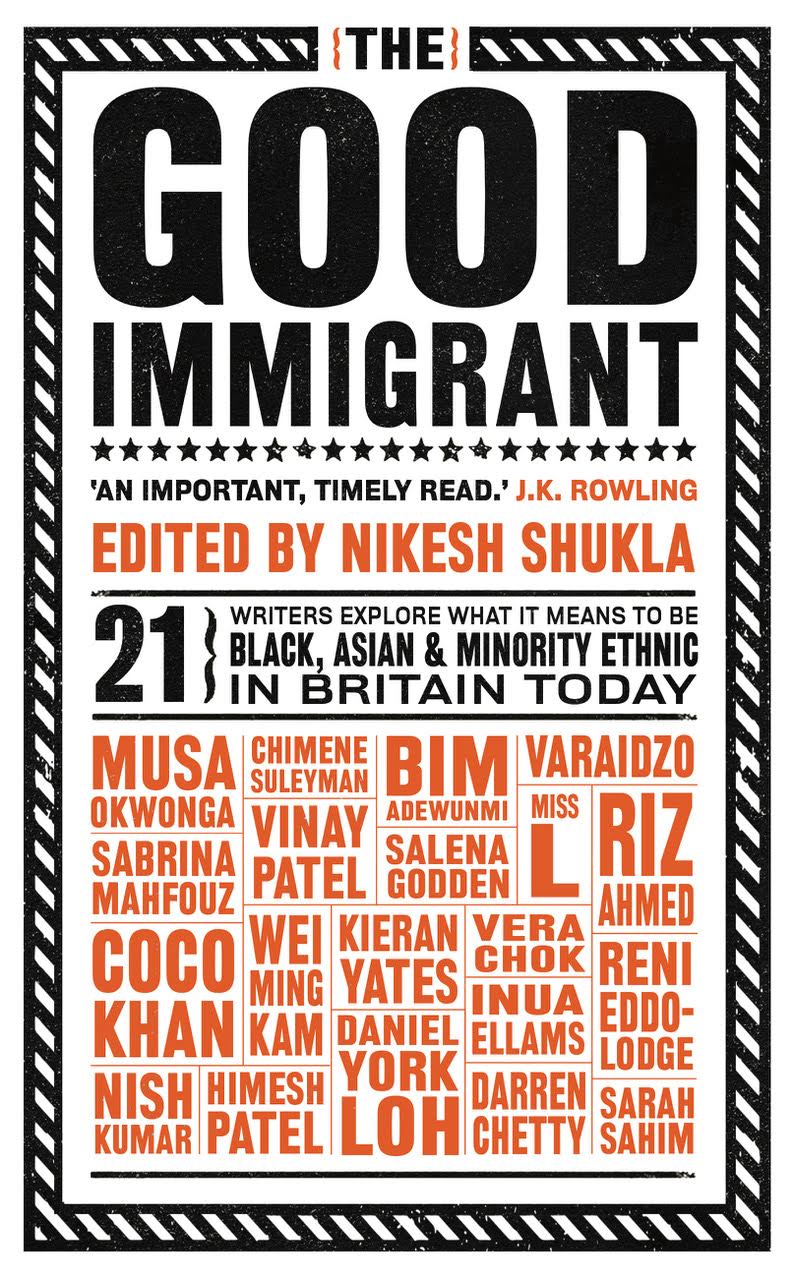The author, Rife magazine founder and one of Foreign Policy magazine’s 100 Global Thinkers on his latest book, The Good Immigrant, London’s best dosas, and being a global citizen
Words Molly Flatt
Images ShamPhat Photography
His latest venture, The Good Immigrant – a collection of stories about race and immigration by 21 British writers of colour, about to be published after smashing its target on crowdfunding platform Unbound – feels almost unbearably timely.
Talking to us from his home in Bristol, where he also edits youth magazine Rife, Shukla told us why he loves ginger and Twitter, why he hates Jonathan Franzen and New Year’s Eve, and whether he feels the publishing industry really is starting to let the breadth of voices that make up modern Britain shine forth.
Congratulations on the success of your latest venture, The Good Immigrant. Why do you think it’s gathered such huge popular support?
I think it’s a combination of things. The writers are shit-hot. There is a hunger for increased representation, more diverse voices, and younger writers. People are tired of being fed the same stories by the same old guard, of not seeing themselves reflected back in popular culture, which is actually an incredibly important thing. We have to see ourselves reflected in order to know what we can aspire to be, to know who we can be, and what spaces we can occupy. And then Brexit happened. And the toxic narrative around the campaign, around immigration was so vile, that we gained this political urgency, to give ownership of the narrative around immigration back to those it directly affects.
We have to constantly justify any space we occupy, show ourselves to be ‘good’ immigrants rather than ‘bad’ ones, and that is an appallingly high and fickle set of standards to be held to…
What’s the best thing about being an immigrant?
I’m the proud child of an immigrant. The title is an ironic stab at the idea that people of colour have to justify their place at the table all the time. I can say, as a proud child of an immigrant, that the best thing is feeling a global pull to the world, to Kenya, to India, to Yemen, to Gujarat, and to England, where I was born. I feel like a global citizen.
And the worst?
We have to constantly justify any space we occupy, show ourselves to be ‘good’ immigrants rather than ‘bad’ ones, and that is an appallingly high and fickle set of standards to be held to by people who would never apply those rules and standards to themselves.
You’re a big promoter of more BAME (British. Black, Asian, and minority ethnic) voices in British literature. Do you think literature is getting more or less diverse?
I think things are changing. I think the publishing industry is slow to change but it is trying. Currently, I think there are lots of projects, initiatives and support to increase the representation of diverse voices that I’m hopeful that things will change. I’m interested to see what the longterm effects of all these initiatives are. And I think that the appetite by readers is there, the will from people in the industry is there, and we know for damn certain the talent is there. So we’ll see. But I’m more hopeful than I was at the end of 2015.
Who is the most underrated writer at work right now?
Oh god, probably Niven Govinden and Salena Godden. Niven is one of the country’s best literary novelists. His books are just so incredible and heavy with beautiful prose. And Salena is one of the most generous souls I’ve ever met, just a powerhouse of a writer, who can deliver laughs and tears in equal measure. Coco Khan and Vera Chok and Varaidzo who all contributed to The Good Immigrant are incredible writers with big futures ahead of them. Tania James is one of my favourite novelists too.

And the most overrated? (Oh, go on….)
Jonathan Franzen. The man is an utter bore and his books are waaaaay overrated. They feel like ‘dysfunctional privileged family has a sad think for 600 pages’.
What one piece of advice would you give to an aspiring writer?
No is the easiest word in the publishing industry. Make it really really hard for people to say no. Make them agonise over that no. Make them feel stomach pangs before saying it. You will get 100 no’s for every yes. And that yes will make the no’s fade away. Make the no hard by choosing who you send the book to carefully, finishing the book to the best of your abilities, having someone read your book who will tell you how great it is (for the confidence-boosting), having someone read your book who will tell you what you need to do to make it better (for the editing), and formatting it correctly.
I love helping young writers and filmmakers develop and find their voices and tell their stories. I love their passion, their opinions and their view of the world. It helps to keep me in check
You’re editor of a youth magazine called Rife. What’s the one biggest misconception about young people nowadays?
That we know best for them. I love my job so much. I love helping young writers and filmmakers develop and find their voices and tell their stories. I love their passion, their opinions and their view of the world. It helps to keep me in check. But also, I feel like we spend a lot of our time speaking for young people: politicians, clickbait newspaper headlines, Owen Jones, teachers. But they don’t need us to talk for them, or take their opinions for granted. Because they don’t need us to. What they need is for us to listen to them, provide access, opportunity and employment, affordable housing, the feeling that their votes count.
What three books should we read over the next couple of months?
The Good Immigrant, obviously. In terms of books just about to come out, the new Zadie Smith book, Swing Time, is utterly incredible and heartbreaking. I really loved A Separation by Katie Kitamura and White Tears by Hari Kunzru as well, both brilliant books. Also, Salena Godden’s memoir Springfield Road and Sabrina Mahfouz’s new collection of poetry, How You Might Know Me.
Do you have a good balance between digital and real life?
No. I know this because when my phone is just on the side, or on a table, my two-year-old will pick it up and give it to me and say ‘here you go, daddy’. Which must mean that she finds it weird that the phone isn’t in my hand.
What one bit of tech would you love to buy?
I’d love a decent hi-fi, with one of those valve amps for playing vinyl. I feel like, as my music collection has digitised, I’ve resorted to tinny playback options: laptop speakers, bluetooth speakers, iPhone headphones. I miss my dad’s hi-fi. It was hardcore. Rap sounded so incredible on it.

Edited by Nikesh Shukla, Published by Cornerstone. Out now, £11.49.
Meet the Most Stylish Show-Goers from Day 4 of London Fashion Week AW17
From bloggers to Editors-in-Chief, we round up the best of the street style contingent
Meet the Most Stylish Show-Goers from Day 3 of London Fashion Week AW17
From bloggers to Editors-in-Chief, we round up the best of the street style contingent
Backstage With New Delhi Womenswear Label N&S GAIA, London Fashion Week AW17
The eco-friendly brand presented a painterly, nature-inspired collection for their second catwalk appearance



